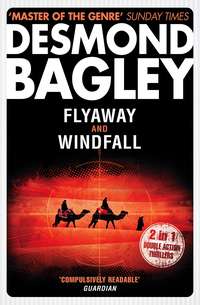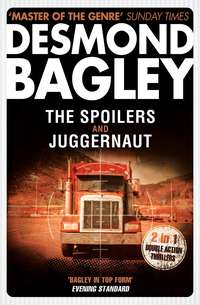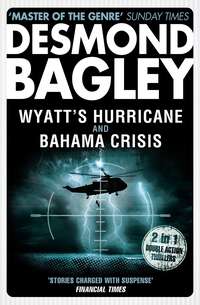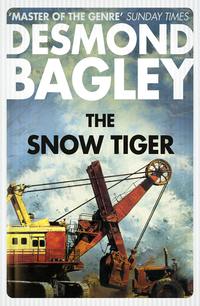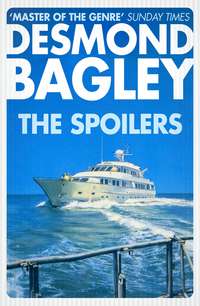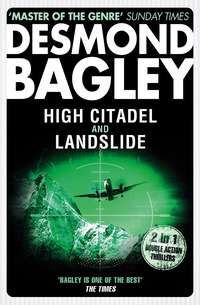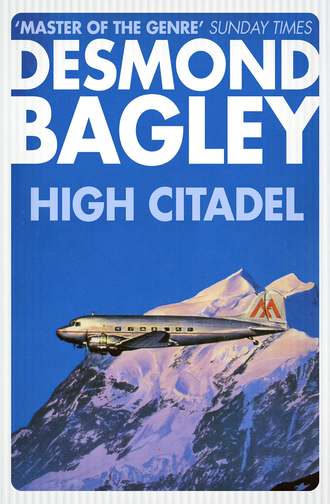
Полная версия
High Citadel
He bent to the first pair of seats on the port side. ‘Could I have your names, please?’
The first man said, ‘I’m Forester.’ The other contributed, ‘Willis.’
‘Glad to have you aboard, Dr Willis, Mr Forester.’
Forester said, ‘I didn’t bargain for this, you know. I didn’t think kites like this were still flying.’
O’Hara smiled deprecatingly. ‘Well, this is an emergency flight and it was laid on in the devil of a hurry. I’m sure it was an oversight that Mr Filson forgot to tell you that this isn’t a pressurized plane.’ Privately he was not sure of anything of the kind.
Willis said with a smile. ‘I came here to study high altitude conditions. I’m certainly starting with a bang. How high do we fly, Captain?’
‘Not more than seventeen thousand feet,’ said O’Hara. ‘We fly through the passes – we don’t go over the top. You’ll find the oxygen mouthpieces easy to use – all you do is suck.’ He smiled and turned away and found himself held. Peabody was clutching his sleeve, leaning forward over the seat behind. ‘Hey, Skipper …’
‘I’ll be with you in a moment, Mr Peabody,’ said O’Hara, and held Peabody with his eye. Peabody blinked rapidly, released his grip and subsided into his seat, and O’Hara turned to starboard.
The man was elderly, with an aquiline nose and a short grey beard. With him was a young girl of startling beauty, judging by what O’Hara could see of her face, which was not much because she was huddled deep into a fur coat. He said, ‘Señor Montes?’
The man inclined his head. ‘Don’t worry, Captain, we know what to expect.’ He waved a gloved hand. ‘You see we are well prepared. I know the Andes, señor, and I know these aircraft. I know the Andes well; I have been over them on foot and by mule – in my youth I climbed some of the high peaks – didn’t I, Benedetta?’
‘Si, tío,’ she said in a colourless voice. ‘But that was long ago. I don’t know if your heart …’
He patted her on the leg. ‘I will be all right if I relax; is that not so, Captain?’
‘Do you understand the use of this oxygen tube?’ asked O’Hara.
Montes nodded confidently, and O’Hara said, ‘Your uncle will be quite all right, Señorita Montes.’ He waited for her to reply but she made no answer, so he passed on to the seats behind.
These couldn’t be the Coughlins; they were too ill-assorted a pair to be American tourists, although the woman was undoubtedly American. O’Hara said inquiringly, ‘Miss Ponsky?’
She lifted a sharp nose and said, ‘I declare this is all wrong, Captain. You must turn back at once.’
The fixed smile on O’Hara’s face nearly slipped. ‘I fly this route regularly, Miss Ponsky,’ he said. ‘There is nothing to fear.’
But there was naked fear on her face – air fear. Sealed in the air-conditioned quietness of a modern jet-liner she could subdue it, but the primitiveness of the Dakota brought it to the surface. There was no clever decor to deceive her into thinking that she was in a drawing-room, just the stark functionalism of unpainted aluminium, battered and scratched, and with the plumbing showing like a dissected body.
O’Hara said quietly, ‘What is your profession, Miss Ponsky?’
‘I’m a school teacher back in South Bridge,’ she said. ‘I’ve been teaching there for thirty years.’
He judged she was naturally garrulous and perhaps this could be a way of conquering her fear. He glanced at the man, who said, ‘Miguel Rohde.’
He was a racial anomaly – a Spanish-German name and Spanish-German features – straw-coloured hair and beady black eyes. There had been German immigration into South America for many years and this was one of the results.
O’Hara said, ‘Do you know the Andes, Señor Rohde?’
‘Very well,’ he replied in a grating voice. He nodded ahead. ‘I lived up there for many years – now I am going back.’
O’Hara switched back to Miss Ponsky. ‘Do you teach geography, Miss Ponsky?’
She nodded. ‘Yes, I do. That’s one of the reasons I came to South America on my vacation. It makes such a difference if you can describe things first-hand.’
‘Then here you have a marvellous opportunity,’ said O’Hara with enthusiasm. ‘You’ll see the Andes as you never would if you’d flown Samair. And I’m sure that Señor Rohde will point out the interesting sights.’
Rohde nodded understandingly. ‘Si, very interesting; I know it well, the mountain country.’
O’Hara smiled reassuringly at Miss Ponsky, who offered him a glimmering, tremulous smile in return. He caught a twinkle in Rohde’s black eyes as he turned to the port side again.
The man sitting next to Peabody was undoubtedly British, so O’Hara said, ‘Glad to have you with us, Dr Armstrong – Mr Peabody.’
Armstrong said, ‘Nice to hear an English accent, Captain, after all this Spa – ’
Peabody broke in. ‘I’m damned if I’m glad to be here, Skipper. What in hell kind of an airline is this, for god-sake?’
‘One run by an American, Mr Peabody,’ said O’Hara calmly. ‘As you were saying, Dr Armstrong?’
‘Never expected to see an English captain out here,’ said Armstrong.
‘Well, I’m Irish, and we tend to get about,’ said O’Hara. ‘I’d put on some warm clothing if I were you. You, too, Mr Peabody.’
Peabody laughed and suddenly burst into song. ‘“I’ve got my love to keep me warm”.’ He produced a hip flask and waved it. ‘This is as good as any top-coat.’
For a moment O’Hara saw himself in Peabody and was shocked and afraid. ‘As you wish,’ he said bleakly, and passed on to the last pair of seats opposite the luggage racks.
The Coughlins were an elderly couple, very Darby and Joanish. He must have been pushing seventy and she was not far behind, but there was a suggestion of youth about their eyes, good-humoured and with a zest for life. O’Hara said, ‘Are you all right, Mrs Coughlin?’
‘Fine,’ she said. ‘Aren’t we, Harry?’
‘Sure,’ said Coughlin, and looked up at O’Hara. ‘Will we be flying through the Puerto de las Aguilas?’
‘That’s right,’ said O’Hara. ‘Do you know these parts?’
Coughlin laughed. ‘Last time I was round here was in 1912. I’ve just come down to show my wife where I spent my misspent youth.’ He turned to her. ‘That means Eagle Pass, you know; it took me two weeks to get across back in 1910, and here we are doing it in an hour or two. Isn’t it wonderful?’
‘It sure is,’ Mrs Coughlin replied comfortably.
There was nothing wrong with the Coughlins, decided O’Hara, so after a few more words he went back to the cockpit. Grivas still had the plane on automatic pilot and was sitting relaxed, gazing forward at the mountains. O’Hara sat down and looked intently at the oncoming mountain wall. He checked the course and said, ‘Keep taking a bearing on Chimitaxl and let me know when it’s two hundred and ten degrees true bearing. You know the drill.’
He stared down at the ground looking for landmarks and nodded with satisfaction as he saw the sinuous, twisting course of the Rio Sangre and the railway bridge that crossed it. Flying this route by day and for so long he knew the ground by heart and knew immediately whether he was on time. He judged that the north-west wind predicted by the meteorologists was a little stronger than they had prophesied and altered course accordingly, then he jacked in the auto pilot again and relaxed. All would be quiet until Grivas came up with the required bearing on Chimitaxl. He sat in repose and watched the ground slide away behind – the dun and olive foothills, craggy bare rock, and then the shining snow-covered peaks. Presently he munched on the sandwiches he took from his briefcase. He thought of washing them down with a drink from his flask but then he thought of Peabody’s whisky-sodden face. Something inside him seemed to burst and he found that he didn’t need a drink after all.
Grivas suddenly put down the bearing compass. ‘Thirty seconds,’ he said.
O’Hara looked at the wilderness of high peaks before him, a familiar wilderness. Some of these mountains were his friends, like Chimitaxl; they pointed out his route. Others were his deadly enemies – devils and demons lurked among them compounded of down draughts, driving snow and mists. But he was not afraid because it was all familiar and he knew and understood the dangers and how to escape them.
Grivas said, ‘Now,’ and O’Hara swung the control column gently, experience telling him the correct turn. His feet automatically moved in conjunction with his hands and the Dakota swept to port in a wide, easy curve, heading for a gap in the towering wall ahead.
Grivas said softly, ‘Señor O’Hara.’
‘Don’t bother me now.’
‘But I must,’ said Grivas, and there was a tiny metallic click.
O’Hara glanced at him out of the corner of his eye and stiffened as he saw that Grivas was pointing a gun at him – a compact automatic pistol.
He jerked his head, his eyes widening in disbelief. ‘Have you gone crazy?’
Grivas’s smiled widened. ‘Does it matter?’ he said indifferently. ‘We do not go through the Puerto de las Aguilas this trip, Señor O’Hara, that is all that matters.’ His voice hardened. ‘Now steer course one-eight-four on a true bearing.’
O’Hara took a deep breath and held his course. ‘You must have gone out of your mind,’ he said. ‘Put down that gun, Grivas, and maybe we’ll forget this. I suppose I have been bearing down on you a bit too much, but that’s no reason to pull a gun. Put it away and we’ll straighten things out when we get to Santillana.’
Grivas’s teeth flashed. ‘You’re a stupid man, O’Hara; do you think I do this for personal reasons? But since you mention it, you said not long ago that sitting in the captain’s seat gave you authority.’ He lifted the gun slightly. ‘You were wrong – this gives authority; all the authority there is. Now change course or I’ll blow your head off. I can fly this aircraft too, remember.’
‘They’d hear you inside,’ said O’Hara.
‘I’ve locked the door, and what could they do? They wouldn’t take the controls from the only pilot. But that would be of no consequence to you, O’Hara – you’d be dead.’
O’Hara saw his finger tighten on the trigger and bit his lip before swinging the control column. The Dakota turned to fly south, parallel to the main backbone of the Andes. Grivas was right, damn him; there was no point in getting himself killed. But what the hell was he up to?
He settled on the bearing given by Grivas and reached forward to the auto pilot control. Grivas jerked the gun. ‘No, Señor O’Hara; you fly this aircraft – it will give you something to do.’
O’Hara drew back his hand slowly and grasped the wheel. He looked out to starboard past Grivas at the high peaks drifting by. ‘Where are we going?’ he asked grimly.
‘That is of no consequence,’ said Grivas. ‘But it is not very far. We land at an airstrip in five minutes.’
O’Hara thought about that. There was no airstrip that he knew of on this course. There were no airstrips at all this high in the mountains except for the military strips, and those were on the Pacific side of the Andes chain. He would have to wait and see.
His eyes flickered to the microphone set on its hook close to his left hand. He looked at Grivas and saw he was not wearing his earphones. If the microphone was switched on then any loud conversation would go on the air and Grivas would be unaware of it. It was definitely worth trying.
He said to Grivas, ‘There are no airstrips on this course.’ His left hand strayed from the wheel.
‘You don’t know everything, O’Hara.’
His fingers touched the microphone and he leaned over to obstruct Grivas’s vision as much as possible, pretending to study the instruments. His fingers found the switch and he snapped it over and then he leaned back and relaxed. In a loud voice he said, ‘You’ll never get away with this, Grivas; you can’t steal a whole aeroplane so easily. When this Dakota is overdue at Santillana they’ll lay on a search – you know that as well as I do.’
Grivas laughed. ‘Oh, you’re clever, O’Hara – but I was cleverer. The radio is not working, you know. I took out the tubes when you were talking to the passengers.’
O’Hara felt a sudden emptiness in the pit of his stomach. He looked at the jumble of peaks ahead and felt frightened. This was country he did not know and there would be dangers he could not recognize. He felt frightened for himself and for his passengers.
III
It was cold in the passenger cabin, and the air was thin. Señor Montes had blue lips and his face had turned grey. He sucked on the oxygen tube and his niece fumbled in her bag and produced a small bottle of pills. He smiled painfully and put a pill in his mouth, letting it dissolve on his tongue. Slowly some colour came back into his face; not a lot, but he looked better than he had before taking the pill.
In the seat behind, Miss Ponsky’s teeth were chattering, not with cold but with conversation. Already Miguel Rohde had learned much of her life history, in which he had not the slightest interest although he did not show it. He let her talk, prompting her occasionally, and all the time he regarded the back of Montes’s head with lively black eyes. At a question from Miss Ponsky he looked out of the window and suddenly frowned.
The Coughlins were also looking out of the window. Mr Coughlin said, ‘I’d have sworn we were going to head that way – through that pass. But we suddenly changed course south.’
‘It all looks the same to me,’ said Mrs Coughlin. ‘Just a lot of mountains and snow.’
Coughlin said, ‘From what I remember, El Puerto de las Aguilas is back there.’
‘Oh, Harry, I’m sure you don’t really remember. It’s nearly fifty years since you were here – and you never saw it from an airplane.’
‘Maybe,’ he said, unconvinced. ‘But it sure is funny.’
‘Now, Harry, the pilot knows what he’s doing. He looked a nice efficient young man to me.’
Coughlin continued to look from the window. He said nothing more.
James Armstrong of London, England, was becoming very bored with Joe Peabody of Chicago, Illinois. The man was a positive menace. Already he had sunk half the contents of his flask, which seemed an extraordinarily large one, and he was getting combatively drunk. ‘Whadya think of the nerve of that goddam fly-boy, chokin’ me off like that?’ he demanded. ‘Actin’ high an’ mighty jus’ like the goddam limey he is.’
Armstrong smiled gently. ‘I’m a – er – goddam limey too, you know,’ he pointed out.
‘Well, jeez, presen’ comp’ny excepted,’ said Peabody. ‘That’s always the rule, ain’t it? I ain’t got anything against you limeys really, excep’ you keep draggin’ us into your wars.’
‘I take it you read the Chicago Tribune,’ said Armstrong solemnly.
Forester and Willis did not talk much – they had nothing in common. Willis had produced a large book as soon as they exhausted their small talk and to Forester it looked heavy in all senses of the word, being mainly mathematical.
Forester had nothing to do. In front of him was an aluminium bulkhead on which an axe and a first-aid box were mounted. There was no profit in looking at that and consequently his eyes frequently strayed across the aisle to Señor Montes. His lips tightened as he noted the bad colour of Montes’s face and he looked at the first-aid box reflectively.
IV
‘There it is,’ said Grivas. ‘You land there.’
O’Hara straightened up and looked over the nose of the Dakota. Dead ahead amid a jumble of rocks and snow was a short airstrip, a mere track cut on a ledge of a mountain. He had time for the merest glimpse before it was gone behind them.
Grivas waved the gun. ‘Circle it,’ he said.
O’Hara eased the plane into an orbit round the strip and looked down at it. There were buildings down there, rough cabins in a scattered group, and there was a road leading down the mountain, twisting and turning like a snake. Someone had thoughtfully cleared the airstrip of snow, but there was no sign of life.
He judged his distance from the ground and glanced at the altimeter. ‘You’re crazy, Grivas,’ he said. ‘We can’t land on that strip.’
‘You can, O’Hara,’ said Grivas.
‘I’m damned if I’m going to. This plane’s overloaded and that strip’s at an altitude of seventeen thousand feet. It would need to be three times as long for this crate to land safely. The air’s too thin to hold us up at a slow landing speed – we’ll hit the ground at a hell of a lick and we won’t be able to pull up. We’ll shoot off the other end of the strip and crash on the side of the mountain.’
‘You can do it.’
‘To hell with you,’ said O’Hara.
Grivas lifted his gun. ‘All right, I’ll do it,’ he said. ‘But I’ll have to kill you first.’
O’Hara looked at the black hole staring at him like an evil eye. He could see the rifling inside the muzzle and it looked as big as a howitzer. In spite of the cold, he was sweating and could feel rivulets of perspiration running down his back. He turned away from Grivas and studied the strip again. ‘Why are you doing this?’ he asked.
‘You would not know if I told you,’ said Grivas. ‘You would not understand – you are English.’
O’Hara sighed. It was going to be very dicey; he might be able to get the Dakota down in approximately one piece, but Grivas wouldn’t have a chance – he’d pile it up for sure. He said, ‘All right – warn the passengers; get them to the rear of the cabin.’
‘Never mind the passengers,’ said Grivas flatly. ‘You do not think that I am going to leave this cockpit?’
O’Hara said, ‘All right, you’re calling the shots, but I warn you – don’t touch the controls by as much as a finger. You’re not a pilot’s backside – and you know it. There can be only one man flying a plane.’
‘Get on with it,’ said Grivas shortly.
‘I’ll take my own time,’ said O’Hara. ‘I want a good look before I do a damn thing.’
He orbited the airstrip four more times, watching it as it spun crazily beneath the Dakota. The passengers should know there was something wrong by this time, he thought. No ordinary airliner stood on its wingtip and twitched about like this. Maybe they’d get alarmed and someone would try to do something about it – that might give him a chance to get at Grivas. But what the passengers could do was problematical.
The strip was all too short; it was also very narrow and made for a much smaller aircraft. He would have to land on the extreme edge, his wingtip brushing a rock wall. Then there was the question of wind direction. He looked down at the cabins, hoping to detect a wisp of smoke from the chimneys, but there was nothing.
‘I’m going to go in closer – over the strip,’ he said. ‘But I’m not landing this time.’
He pulled out of orbit and circled widely to come in for a landing approach. He lined up the nose of the Dakota on the strip like a gunsight and the plane came in, fast and level. To starboard there was a blur of rock and snow and O’Hara held his breath. If the wingtip touched the rock wall that would be the end. Ahead, the strip wound underneath, as though it was being swallowed by the Dakota. There was nothing as the strip ended – just a deep valley and the blue sky. He hauled on the stick and the plane shot skyward.
The passengers will know damn well there’s something wrong now, he thought. To Grivas he said, ‘We’re not going to get this aircraft down in one piece.’
‘Just get me down safely,’ said Grivas. ‘I’m the only one who matters.’
O’Hara grinned tightly. ‘You don’t matter a damn to me.’
‘Then think of your own neck,’ said Grivas. ‘That will take care of mine, too.’
But O’Hara was thinking of ten lives in the passenger cabin. He circled widely again to make another approach and debated with himself the best way of doing this. He could come in with the undercarriage up or down. A belly-landing would be rough at that speed, but the plane would slow down faster because of the increased friction. The question was: could he hold her straight? On the other hand if he came in with the undercarriage down he would lose airspeed before he hit the deck – that was an advantage too.
He smiled grimly and decided to do both. For the first time he blessed Filson and his lousy aeroplanes. He knew to a hair how much stress the undercarriage would take; hitherto his problem had been that of putting the Dakota down gently. This time he would come in with undercarriage down, losing speed, and slam her down hard – hard enough to break off the weakened struts like matchsticks. That would give him his belly-landing, too.
He sighted the nose of the Dakota on the strip again. ‘Well, here goes nothing,’ he said. ‘Flaps down; undercarriage down.’
As the plane lost airspeed the controls felt mushy under his hands. He set his teeth and concentrated as never before.
V
As the plane tipped wing down and started to orbit the airstrip Armstrong was thrown violently against Peabody. Peabody was in the act of taking another mouthful of whisky and the neck of the flask suddenly jammed against his teeth. He spluttered and yelled incoherently and thrust hard against Armstrong.
Rohde was thrown out of his seat and found himself sitting in the aisle, together with Coughlin and Montes. He struggled to his feet, shaking his head violently, then he bent to help Montes, speaking quick Spanish. Mrs Coughlin helped her husband back to his seat.
Willis had been making a note in the margin of his book and the point of his pencil snapped as Forester lurched against him. Forester made no attempt to regain his position but looked incredulously out of the window, ignoring Willis’s feeble protests at being squashed. Forester was a big man.
The whole cabin was a babel of sound in English and Spanish, dominated by the sharp and scratchy voice of Miss Ponsky as she querulously complained. ‘I knew it,’ she screamed. ‘I knew it was all wrong.’ She began to laugh hysterically and Rohde turned from Montes and slapped her with a heavy hand. She looked at him in surprise and suddenly burst into tears.
Peabody shouted, ‘What in goddam hell is that limey doing now?’ He stared out of the window at the airstrip. ‘The bastard’s going to land.’
Rohde spoke rapidly to Montes, who seemed so shaken he was apathetic. There was a quick exchange in Spanish between Rohde and the girl, and he pointed to the door leading to the cockpit. She nodded violently and he stood up.
Mrs Coughlin was leaning forward in her seat, comforting Miss Ponsky. ‘Nothing’s going to happen,’ she kept saying. ‘Nothing bad is going to happen.’
The aircraft straightened as O’Hara came in for his first approach run. Rohde leaned over Armstrong and looked through the window, but turned as Miss Ponsky screamed in fright, looking at the blur of rock streaming past the starboard window and seeing the wingtip brushing it so closely. Then Rohde lost his balance again as O’Hara pulled the Dakota into a climb.
It was Forester who made the first constructive move. He was nearest the door leading to the cockpit and he grabbed the door handle, turned and pushed. Nothing happened. He put his shoulder to the door but was thrown away as the plane turned rapidly. O’Hara was going into his final landing approach.
Forester grabbed the axe from its clips on the bulkhead and raised it to strike, but his arm was caught by Rohde. ‘This is quicker,’ said Rohde, and lifted a heavy pistol in his other hand. He stepped in front of Forester and fired three quick shots at the lock of the door.
VI
O’Hara heard the shots a fraction of a second before the Dakota touched down. He not only heard them but saw the altimeter and the turn-and-climb indicator shiver into fragments as the bullets smashed into the instrument panel. But he had not time to see what was happening behind him because just then the heavily overloaded Dakota settled soggily at the extreme end of the strip, moving at high speed.


